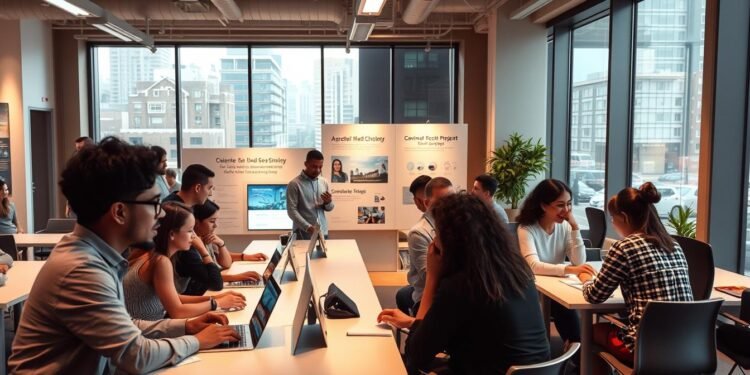What if the biggest barrier to creating social impact isn’t a lack of passion, but a shortage of strategic support? Many mission-driven organizations struggle to turn their visionary ideas into sustainable ventures that create lasting positive change.
Specialized support systems have emerged to bridge this gap. These initiatives help social entrepreneurs transform their concepts into effective solutions. They offer crucial resources that early-stage startups need to thrive.
This growth is visible across the United States and expanding globally. Regions like Latin America are seeing rapid development in their accelerator industry. Organizations addressing critical issues from human rights to health benefit immensely.
Programs like Fast Forward demonstrate this powerful model. They focus specifically on tech nonprofits, providing targeted mentorship and networking opportunities. This specialized approach helps founders build scalable organizations ready for investment.
Key Takeaways
- Specialized support systems help transform social ideas into sustainable ventures
- These initiatives provide crucial resources for early-stage mission-driven organizations
- The support model is growing rapidly in the United States and globally
- Programs offer targeted mentorship, funding access, and networking opportunities
- Tech-focused accelerators help build scalable solutions for critical social issues
- Proper support prepares organizations for investment and greater impact
- Choosing the right program maximizes success for social entrepreneurs
Understanding Incubator and Accelerator Programs for NGOs
Many mission-driven organizations seek structured environments to transform their visions into reality. These supportive ecosystems provide essential tools for growth and development.
What Are Incubator Programs?
These supportive environments help social entrepreneurs develop early concepts. They offer workspace, training, and mentorship to build viable ventures.
Participants receive guidance through the initial stages of their journey. This foundation is crucial for long-term success and sustainability.
Differences Between Incubators and Accelerators
Incubators focus on nurturing early-stage ideas into functional models. They provide resources during the formative development phase.
Accelerators target more established startups ready for rapid scaling. These intensive initiatives operate within fixed timeframes.
They deliver funding, mentorship, and networking opportunities. This approach helps organizations achieve quick growth and expansion.
Why NGOs Should Consider These Programs
Mission-driven entities gain tailored support for social impact goals. They access non-dilutive funding and specialized resources.
These initiatives help address unique challenges like board development. They also assist with volunteer management strategies.
The support model continues evolving across global regions. Latin America shows particular growth through mixed capital investment.
This ecosystem provides tools for sustainability and scaled impact. Organizations learn valuable approaches from successful business models.
Key Benefits of Joining an Incubator Program
Mission-driven organizations gain powerful advantages when they enter these structured environments. The comprehensive support system accelerates growth and maximizes impact potential.
Access to Funding and Grants
Financial resources become available without sacrificing organizational control. Many initiatives provide non-dilutive grants that maintain full ownership.
Fast Forward demonstrates this model with their $25,000 award. This capital injection helps early-stage ventures develop their operations. It creates stability during critical growth phases.
Mentorship and Expert Guidance
Seasoned professionals share valuable knowledge and experience. They help navigate complex challenges in strategy and operations.
This guidance prevents common mistakes that hinder progress. Organizations learn effective measurement techniques for their social impact. The learning curve dramatically shortens with expert support.
Programs like Y Combinator maintain relationships beyond the initial period. This ongoing mentorship provides continuous improvement opportunities.
Networking Opportunities
Connections form with potential investors, partners, and industry leaders. These relationships open doors to future collaborations and funding sources.
The right network accelerates visibility and growth potential. Peer connections create valuable learning opportunities among similar organizations.
This ecosystem fosters partnerships that drive positive change. Collective efforts often achieve greater results than individual attempts.
These benefits work together to create accelerated development. Organizations achieve scalability faster and increase their impact in critical areas like human rights. The community atmosphere provides motivation and long-term relationship building.
Top Incubator Programs for NGOs in the United States
Selecting the right growth environment makes all the difference for mission-driven ventures. Several standout initiatives offer distinct advantages for social entrepreneurs.
Each provides unique resources tailored to different development stages. Understanding these options helps founders make informed decisions.
Fast Forward: Tech Nonprofit Accelerator
This initiative focuses exclusively on tech ventures addressing critical social issues. Since 2013, they’ve helped organizations raise over $753 million.
The program provides a $25,000 grant and 13 weeks of intensive training. Participants gain access to expert mentors and industry connections.
They support nonprofits working in education, health, and human rights. Their commitment to diversity stands out with over 26% Black-founded ventures.
Y Combinator: Prestigious Support for Early-Stage Startups
This renowned accelerator invests $120,000 twice annually in promising startups. While not exclusively for nonprofit ventures, they welcome mission-driven companies.
The program offers intensive mentorship and culminates in Demo Day. This event lets founders pitch to top investors.
Their massive alumni network provides ongoing support and connection opportunities. This community helps entrepreneurs scale their solutions effectively.
Mass Challenge: No-Equity Accelerator
This global initiative operates on a unique no-equity model. They accelerated 483 ventures across various industries in 2023.
Founders receive free office space and expert guidance. Locations span Boston, Israel, Mexico, Switzerland, and the UK.
Their approach removes financial barriers for early-stage startups. This allows organizations to focus entirely on developing their technology and impact.
These distinct programs demonstrate the variety of support available. Each offers different funding structures and specialized resources.
Social entrepreneurs can find the perfect fit for their specific needs. The right choice accelerates growth and maximizes social impact.
Programs with a Focus on Social Impact
Some initiatives stand out for their deep commitment to creating meaningful change. These specialized environments help visionaries turn ambitious ideas into reality.
They provide tailored resources for mission-driven organizations. Each offers unique approaches to scaling social good.
Unreasonable Group: Tackling Global Issues
This initiative brings together entrepreneurs solving humanity’s toughest challenges. Their invitation-only fellowship creates powerful collaboration opportunities.
Participants gain access to an incredible network of 410 fellows worldwide. They connect with 2,300 investors and 1,120 mentors.
This community-driven approach accelerates solutions for global problems. The model fosters collective action toward positive change.
SEED SPOT: Empowering Change-Makers
This organization runs an intensive 8-week virtual accelerator. They provide personalized coaching and practical business tools.
Founders learn strategies for revenue growth and sustainable operations. The support continues through lifetime alumni benefits.
Their results demonstrate real impact. Alumni have generated $399 million in revenue.
They created 9,000 jobs while driving social impact across communities.
Halcyon: Supporting Impact-Driven Businesses
This fellowship focuses on ventures where social mission comes first. They help social enterprises integrate purpose into their core DNA.
Participants receive workspace, community support, and funding resources. The program emphasizes equity and inclusivity.
This approach ensures businesses remain true to their original vision. It creates lasting change through sustainable models.
These accelerators offer distinct pathways for social entrepreneurs. Each provides specialized resources for maximum impact.
The right choice depends on your organization’s specific goals and stage.
Specialized Programs for Nonprofit Growth
Three distinctive initiatives are redefining support for mission-driven organizations. These specialized environments address specific needs within the social impact sector.
Each offers unique approaches to scaling operations and increasing community benefit. They fill important gaps in the support landscape.
People’s Nonprofit Accelerator: Community-Built Support
This community-driven initiative offers workshops on constituent management and strategic planning. The program provides flexible membership options tailored to organizational needs.
Tuition operates on a sliding scale based on annual budget. This model ensures accessibility for diverse nonprofits across the United States.
Participants gain practical skills for sustainable operations. The approach emphasizes peer learning and shared resources.
gBETA Social Impact: Free Virtual Accelerator
This seven-week virtual accelerator focuses on early-stage startups addressing critical societal issues. The program specifically targets education equity and criminal justice reform.
Participants receive personalized coaching and access to potential investors. The completely free model removes financial barriers for emerging organizations.
This accelerator creates valuable networking opportunities within the social impact space. Founders connect with mentors who understand their specific challenges.
SEA Change: Mission-Driven Business Building
This sixteen-week accelerator helps founders build ventures that balance purpose and profit. The program offers online learning modules and regional cohort opportunities.
Participants join a national affiliate network of mission-driven companies. This community provides ongoing support beyond the initial program duration.
The free structure makes professional development accessible to social entrepreneurs. Emphasis remains on creating sustainable business models that drive meaningful change.
These specialized initiatives demonstrate the evolving support landscape for social ventures. Each addresses specific needs through tailored resources and community building.
Organizations can find the right fit based on their development stage and focus areas. The diversity of options ensures relevant support for various mission-driven models.
How to Choose the Right Incubator Program
Finding the perfect growth environment requires careful consideration of multiple factors. The right match can accelerate your mission while poor alignment may waste valuable resources.
Assessing Your Organization’s Needs
Begin by evaluating your current development stage. Are you at idea phase, seed stage, or ready for scaling?
Identify specific focus areas like technology development or community outreach. Pinpoint resource gaps in funding, mentorship, or operational capacity.
This honest assessment creates a clear roadmap for selection. It ensures you seek support that addresses actual needs rather than perceived wants.
Evaluating Program Offerings and Fit
Examine curriculum relevance to your social mission. Quality mentorship from experienced professionals proves invaluable.
Review financial terms carefully. Some initiatives offer grants while others use equity-based models.
Research alumni success stories within your sector. Strong network connections with investors often determine long-term success.
Consider post-program support and community engagement. Ongoing access to resources sustains growth beyond the initial phase.
Considering Location and Format
Determine whether in-person or virtual formats suit your capacity. Programs like Fast Forward offer physical locations while others provide digital access.
Evaluate time commitment requirements against organizational bandwidth. Intensive formats demand significant focus but deliver accelerated results.
Geographic location affects networking opportunities and local resource access. Choose environments that align with your operational needs and growth strategy.
Thorough research ensures optimal alignment between your needs and program offerings. The right choice maximizes your social impact potential while conserving valuable resources.
Application Process for Incubator Programs
Navigating the application journey requires strategic preparation and attention to detail. Successful candidates approach this process with clarity about their goals and organizational needs.
Understanding each step helps social entrepreneurs present their strongest case. The right preparation increases chances of acceptance into competitive environments.
Preparing Your Application
Begin by gathering essential documents that showcase your mission and impact. Organizational details should include legal status and operational history.
Develop compelling narratives about your social goals and achievements. Impact metrics demonstrate your current effectiveness and future potential.
Team information highlights collective experience and commitment. Draft responses separately before finalizing your complete submission.
Ensure all materials align with the specific accelerator program’s focus areas. Tailor your application to emphasize relevant strengths and capabilities.
Common Requirements and Tips
Most applications request proof of nonprofit status and detailed business plans. Financial projections show your understanding of sustainable operations.
Letters of recommendation validate your work and potential from external perspectives. Highlight your unique value proposition throughout all materials.
Emphasize social impact through concrete examples and measurable results. For technology-focused initiatives like Fast Forward, demonstrate your technical approach.
Programs like SEED SPOT value strong impact metrics and community engagement. Check spam folders regularly for application updates and requests.
Show team commitment and readiness for intensive growth periods. Scalability potential often determines selection in competitive processes.
What to Expect During the Selection Process
The journey typically involves multiple evaluation stages after submission. Initial application reviews identify promising candidates for further consideration.
Many initiatives conduct interviews to assess team dynamics and commitment. Pitch presentations allow founders to demonstrate their vision directly.
Evaluation panels often include mentors, investors, and program alumni. Mass Challenge uses a multi-stage process with specific notification timelines.
Some organizations provide feedback regardless of acceptance outcome. This valuable input helps strengthen future applications.
The entire process emphasizes finding ventures ready for accelerated growth. Demonstrating alignment with program goals increases your chances significantly.
Success Stories: NGOs Thriving After Incubator Programs
Concrete achievements demonstrate the transformative power of structured support systems. Real-world examples show how social ventures scale their operations and maximize community benefit.
These success stories highlight measurable outcomes across different sectors. They prove that strategic guidance creates lasting positive change.
Case Study: Fast Forward Alumni
Technology-driven social enterprises show remarkable growth through specialized support. Since 2013, their alumni network has raised over $753 million in funding.
These ventures develop innovative solutions for education and health challenges. Their technology platforms reach underserved communities across the United States.
One organization created a digital learning tool for rural schools. Another built a healthcare access platform for low-income families.
These startups demonstrate how targeted support accelerates social impact. Their success inspires new entrepreneurs to pursue meaningful change.
Case Study: Y Combinator Nonprofit Graduates
This prestigious accelerator helps mission-driven organizations achieve rapid scaling. Selected nonprofits gain access to extensive investor networks.
Graduates leverage mentorship from industry leaders and successful founders. This guidance helps them refine their models and expansion strategies.
Many alumni secure significant follow-on funding after completing the program. Their growth demonstrates the value of high-quality network connections.
These ventures create sustainable models for addressing complex social issues. Their achievements show how strategic support drives measurable impact.
Case Study: SEED SPOT Impact Ventures
This initiative’s alumni have generated $399 million in revenue while creating over 9,000 jobs. Their community-focused solutions deliver long-term benefits.
Participants develop strong operational foundations during the program. They learn to balance mission delivery with financial sustainability.
One venture established a successful workforce development model. Another created an environmental conservation program with national reach.
These social enterprises maintain connections through alumni opportunities. Ongoing support ensures continued growth and positive change.
Their stories prove that proper guidance creates lasting transformation. Early-stage startups can achieve remarkable scale with the right resources.
Beyond the Program: Sustaining Growth Post-Incubation
Graduation marks not an endpoint but a launchpad for sustained organizational growth and deeper community engagement. The most successful ventures view their experience as foundational rather than conclusive.
They leverage gained knowledge and connections to build enduring social impact. This ongoing development phase separates temporary projects from lasting institutions.
Leveraging Alumni Networks
Alumni communities provide invaluable networking opportunities for continued collaboration. Programs like Y Combinator maintain active networks where founders connect regularly.
These relationships often lead to partnership opportunities and resource sharing. Social entrepreneurs find new pathways through peer recommendations.
The collective wisdom within these groups accelerates problem-solving. Many social enterprises discover expansion possibilities through alumni connections.
Continuing Mentorship and Support
Formal alumni services ensure ongoing access to expert guidance. SEED SPOT offers lifetime benefits including mentor introductions.
Informal relationships built during the program often evolve into advisory roles. These connections provide crucial support during challenging growth phases.
Seasoned mentorship helps navigate scaling complexities. This continuous guidance prevents common pitfalls during expansion.
Scaling Your Impact Long-Term
Successful organizations apply learned frameworks to new projects and markets. They pursue additional funding through investor network introductions.
Strategic expansion into new sectors multiplies positive change. Measurable impact grows through refined operational models.
Alumni events and newsletters maintain engagement between graduates. These platforms share best practices and innovation updates.
Online communities facilitate knowledge exchange across geographic boundaries. This continuous learning environment fosters adaptation to new challenges.
The most effective ventures view their experience as a foundation for evolution. They leverage community resources to maximize social impact over decades rather than years.
Resources and Additional Support for NGOs
Building a sustainable mission requires diverse support systems beyond structured growth environments. Numerous complementary resources exist to help social ventures maintain momentum and scale their impact.
Funding Opportunities Outside Accelerators
Multiple financial pathways exist beyond traditional accelerator programs. Foundation grants offer substantial support for specific initiatives.
The Grantham Foundation provides environmental grants. Mercy Corps Ventures funds anticipatory action projects.
Impact investing connects mission-driven organizations with aligned capital sources. Crowdfunding platforms enable community-backed fundraising campaigns.
Government grants support various social initiatives. These diverse funding streams create financial stability for long-term operations.
Networking Events and Communities
Industry conferences create valuable connection opportunities. Events like those hosted by People’s Nonprofit Accelerator bring together change-makers.
Online forums facilitate knowledge sharing across geographic boundaries. Local meetups build regional collaboration networks.
These gatherings help organizations find potential partners and mentors. They provide platforms for sharing best practices and innovative approaches.
Strong professional networks often lead to collaborative projects. They create opportunities for resource sharing and collective problem-solving.
Tools for Nonprofit Management
Modern technology solutions streamline organizational operations. CRM systems manage donor relationships effectively.
Impact measurement tools track social outcomes. Financial planning software ensures sustainable budgeting.
IKEA Social Entrepreneurship offers partnership programs for scaling social businesses. These tools complement accelerator experiences.
They help organizations maintain efficiency during growth phases. Proper management systems ensure long-term sustainability.
Proactively seeking these resources builds robust support ecosystems. They enhance organizational capacity for lasting social impact.
Conclusion
Accelerated development pathways offer mission-driven organizations the springboard they need for scalable change. These structured environments provide essential resources that transform visionary ideas into sustainable operations.
Social entrepreneurs gain crucial access to funding, expert guidance, and valuable networks. This comprehensive support helps avoid common pitfalls while maximizing community impact.
Explore the diverse initiatives available across the United States and beyond. Assess each option based on your specific goals and organizational capacity.
Taking this strategic step accelerates positive transformation. It positions your venture for long-term success and greater social benefit.
Leverage this guide to find your ideal growth environment. Begin your journey toward amplified impact and sustainable change today.
FAQ
What is the main difference between an incubator and an accelerator?
Incubators typically support very early-stage ideas with longer-term guidance, while accelerators offer intensive, short-term programs focused on rapid growth for more established startups.
Do nonprofit organizations have to give up equity to join these programs?
Many social impact accelerators like Mass Challenge and Fast Forward operate as no-equity programs, meaning nonprofits retain full ownership while receiving support.
How competitive are applications for top accelerator programs?
Leading programs like Y Combinator and Fast Forward are highly selective, often accepting less than 2% of applicants, making strong mission alignment and growth potential crucial.
What types of mentorship can NGOs expect from these programs?
Participants receive guidance from experienced entrepreneurs, industry experts, and successful founders covering areas like fundraising, strategy, technology implementation, and impact measurement.
Are there virtual or remote options available for NGOs?
Yes, programs like gBETA Social Impact offer completely virtual accelerators, while many others provide hybrid models, making them accessible to organizations across different locations.
What kind of networking opportunities do these programs provide?
Participants connect with investors, potential partners, fellow social entrepreneurs, and industry leaders through demo days, curated events, and alumni networks.
How long do typical incubator and accelerator programs last?
Programs vary from 3-6 months for accelerators to 1-2 years for incubators, with some offering ongoing support through alumni networks and continued mentorship.
What criteria should NGOs consider when choosing a program?
Organizations should evaluate program focus areas, mentorship quality, network strength, funding opportunities, and alignment with their specific stage and mission.







